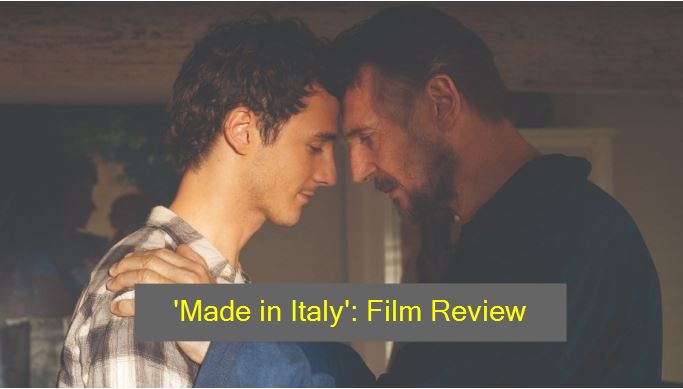‘Made in Italy’: Film Review
Real-life father and son Liam Neeson and Micheál Richardson topline a Tuscany-set comic drama, actor James D’Arcy’s first feature as writer-director.
The salutary effect on Brits of the sunny Continent, with its heart-opening, upper-lip-loosening powers, has fueled a well-populated movie subgenre. Using the change of scenery to explore a father-son relationship, the Tuscany-set Made in Italy arrives as a less-than-memorable entry, peppering predictable dashes of romance and real estate into a neatly defined recipe.
In his debut outing as a feature filmmaker, actor James D’Arcy (Hitchcock, Dunkirk) doesn’t hide his admiration for the setting’s picture-postcard light and small-village conviviality. Mainly, though, he’s concerned with the tug of emotion that the place provokes for his central characters. Chirpy songs on the soundtrack set an upbeat mood, but the score by Alex Belcher often pulses at a lower frequency — one that the narrative can only gesture toward, falling within familiar lines in ways that are far too tidy.
Mostly the film offers the chance to see Liam Neeson in a welcome excursion beyond his usual action-thriller territory. He stars with Micheál Richardson, his eldest son with the late Natasha Richardson, in a father-son story whose tender tears and gentle uplift are more manufactured than earned, notwithstanding their considerable offscreen resonance.
Neeson’s Robert Foster had his heyday as a famous painter but has been absent from the art-world scene for years. That includes the hotspot London gallery managed by son Jack (Richardson), whose need to buy the place from his soon-to-be-ex-wife (Yolanda Kettle) kick-starts the story. Jack flashes on the family house lying dormant in Tuscany as the solution to his money problems, and heads there with the Italian property’s other owner, his dad, for what they expect will be a quick sale.
Given that Robert and Jack rarely speak to each other, the former’s agreement to the plan suggests that he has nothing better to do or that, subconsciously perhaps, he’s ready to face what he’s long pushed aside — namely, his grief over the devastating loss of his Italian wife twenty years earlier. More readily, father and son acknowledge their general disconnect, and this self-aware comic aspect of their relationship is far more convincing than the melodramatic tension that D’Arcy strives to build.
But the director makes effective, if obviously symbolic, use of the shuttered house that locals refer to as “deserted.” Fittingly, the two men arrive at the tumbledown villa in the thick of night, gradually uncovering the layers of dust and cobwebs, the dead bugs and live varmints that have overtaken the place, not to mention the Harry Potter posters in the bedroom that Jack last used when he was 7. The movie’s pointed glances at a locked shed, on the other hand, signal all too plainly the unspoken things between Robert and Jack, culminating in a big confrontation that checks the formula boxes and skimps on emotional impact.
By contrast, there’s a heart-stopping moment between Robert and stern real estate agent Kate (Lindsay Duncan), the British transplant who’s overseeing the renovation project. They exchange a few words of hard-won wisdom with breathtaking directness and honesty. Sharply written and performed without the slightest actorly mannerism, the scene stands apart from the film’s unsteady mix of the comic and the melodramatic. Jack’s budding romance with a trattoria owner (Valeria Bilello), though it starts with a well-executed bit of slapstick, quickly becomes the weakest link in the plot, her artistry as a chef no more involving than the complications presented by her ex (Gian Marco Tavani).
Along the home-improvement way, local old-timers are enlisted for their know-how and labor, provoking fear that the movie will turn into a Tuscan spin on A Year in Provence. Thankfully, D’Arcy dispenses with this aspect of the story quickly and with spirited energy. (The before-and-after production design by Stevie Herbert is pitch-perfect, at its center an indoor mural painted by Robert in the depths of guilt, sorrow and rage.) But the helmer indulges in some painfully broad real estate comedy in the form of luxury buyers who are caricatured to the hilt. He and his cast fare better with such offhand details as the plastic utensils that the ill-equipped Robert and Jack must use in the exquisite locale.
Turning his famous furrowed brow away from the realm of life-and-death nail-biters, Neeson elevates the proceedings with his dry delivery and nimble comic timing. Made in Italy makes you wish the actor did more comedy. He also knows how to pack a simple gaze at a long-empty marital bed with Robert’s years’ worth of unexpressed pain. The film doesn’t need to be a dark and brooding heart-wringer, but given the real-life grief that Neeson and Richards undoubtedly brought to it, it’s a shame that this trip abroad isn’t more memorable.
In theaters and on demand
Distributor: IFC Films
Production companies: CrossDay Productions, Ingenious Media, HanWay Films, Indiana Productions
Cast: Liam Neeson, Micheál Richardson, Valeria Bilello, Lindsay Duncan, Yolanda Kettle, Gian Marco Tavani, Helena Antonio
Director-screenwriter: James D’Arcy
Producers: Pippa Cross, Sam Tipper-Hale
Executive producers: Alessandro Mascheroni, Daniel Campos Pavoncelli, Janette Day, James D’Arcy, Martin Rushton-Turner, Gabrielle Stewart, Peter Watson, Zygi Kamasa, Peter Touche, Anders Erdén, Marco Cohen, Benedetto Habib, Fabrizio Donvito
Director of photography: Mike Eley
Production designer: Stevie Herbert
Costumer designer: Louise Stjernsward
Editors: Mark Day, Anthony Boys
Composer: Alex Belcher
Casting director: Martin Ware



